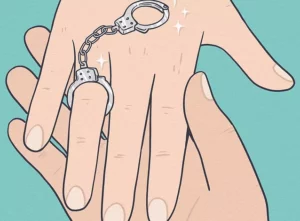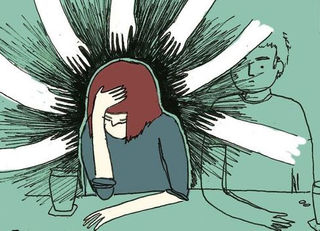Do you ever have intrusive thoughts about your relationship? Thoughts that make you feel like you’re not good enough for your partner, or that you’re going to lose them? If so, you’re not alone. Intrusive thoughts are a common occurrence in relationships and can be incredibly damaging if left untreated. In this blog post, we will discuss what intrusive thoughts are, and how to deal with them effectively.
Contents
Defining Intrusive Thoughts About Relationships

Also popularly known as Relationship OCD, intrusive thoughts about relationships are defined as unwanted, intrusive thoughts, images, or impulses that occur repeatedly in your mind and cause you distress. These thoughts can be about anything from your partner cheating on you, to them leaving you, to feeling like you’re not good enough for them. Intrusive thoughts are often accompanied by negative emotions such as anxiety, fear, or shame. Intrusive thoughts are often the result of anxiety or stress and do not reflect how you truly feel about your relationship. It also doesn’t mean that you’re going to act on these thoughts. It’s also important to remember that everyone experiences intrusive thoughts from time to time; it’s only when they become excessive and start to impact your life negatively that they become a problem.
This condition gets extreme when your doubts and discomfort about a romantic relationship become uncontrollable and hurt the relationship.
Causes Of Relationship Intrusive Thoughts
There are many different causes of relationship intrusive thoughts. For some people, it may be due to a previous bad experience such as being cheated on or divorced. For others, it may be due to anxiety or stress about the future of the relationship. It’s important to remember that everyone experiences intrusive thoughts differently and there is no one cause. Physiological factors such as a chemical imbalance in the brain and head injury causing trauma in the body can also develop a vulnerability to OCD.
It’s also important to remember that intrusive thoughts are not your fault. You didn’t choose to have them and you can’t control them.
Signs Of Relationship Intrusive Thoughts

There are many different signs of relationship intrusive thoughts. Some people may experience them occasionally, while others may experience them constantly. The most common sign is feeling like you’re not good enough for your partner or that you’re going to lose them. Other signs include:
- Constantly doubting your relationship
- Worrying about your partner cheating on you
- Feeling like you’re not good enough for them
- Fearing that something bad will happen to your partner
- Feeling anxious or stressed about the future of your relationship
- Constantly questioning your partner’s loyalty
- Fixating your partner’s flaws
- Being unsure about your feelings towards your partner
- Images or impulses of your partner cheating on you
- Thoughts of leaving your partner
Effects Of Relationship Intrusive Thoughts

Intrusive thoughts can have several negative effects on your relationship.
- They can cause you to doubt yourself and your relationship, which can lead to arguments or conflict.
- They can also make you feel isolated and alone, as you may be afraid to tell your partner about the thoughts you’re having.
- In severe cases, intrusive thoughts can lead to depression or anxiety disorders as well as sleep problems
- It can prove to be burdensome for the partner as they might not know how to deal with these questions and thoughts.
- Reduced quality of relationships, depreciating feelings, and low intimacy
- Rising feelings of suspicion, lack of trust, and second-guessing thoughts, which can manifest as projections of internal feelings onto the partner.
Treatment For Relationship Intrusive Thoughts
Just like any other disorder, intrusive thoughts surrounding relationships can also be managed through therapeutic support as well as self-help tips.
Treatment options
- Cognitive-behavioral therapy: This type of therapy can help you manage your intrusive thoughts by changing the way you think about them.
- Exposure and response prevention: This type of therapy involves gradually exposing yourself to the things that trigger your intrusive thoughts and then learning how to control your response to them.
- Couples counseling can help both partners work through the difficult parts of the disorder and have a sense of additional support.
- Medication: In some cases, medication may be necessary to help control the symptoms of OCD.
Self Help Tips
In addition to professional help, there are a few things you can do at home to help ease your intrusive thoughts.
- Keeping a thought diary can help you track your intrusive thoughts and see how they’re affecting you.
- Exercising regularly helps to reduce stress and anxiety, which can trigger intrusive thoughts.
- One of the most important things you can do is practice self-compassion. This means being kind and understanding towards yourself when you’re having intrusive thoughts.
- It’s also important to avoid avoidance behaviors such as drinking, using drugs, or overeating. These behaviors will only make your intrusive thoughts worse in the long run.
- Having honest and open conversations with your partner can help in nurturing a feeling of safety and belonging and trust.
- Finally, it can be extremely beneficial to engage in healthy coping mechanisms such as exercise, journaling, and relaxation techniques.
Conclusion
Intrusive thoughts about relationships are a common occurrence but they can be damaging if left untreated. If you’re struggling with intrusive thoughts, seek professional help. In addition to professional help, there are a few things you can do at home to ease your intrusive thoughts such as practicing self-compassion and avoiding avoidance behaviors. Remember, you’re not alone in this and there is help available. Therapists at Mantra Care provide a safe and inclusive space for therapeutic support through affordable online therapy sessions from all around the world.
If you are looking for affordable Online OCD Counseling MantraCare can help: Book a trial OCD therapy session


